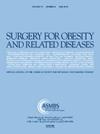Distressed community index as a predictor of metabolic and bariatric surgery outcomes
IF 3.8
3区 医学
Q1 SURGERY
引用次数: 0
Abstract
Background
Obesity is associated with serious health and social consequences. Socioeconomically disadvantaged people are less likely to undergo metabolic and bariatric surgery (MBS) than their socioeconomically advantaged counterparts and experience increased complications or health care resource utilization, such as longer length of stay. The Economic Innovation Group's Distressed Communities Index (DCI) offers a metric to broadly assess socioeconomic distress.
Objectives
This study investigated the relationship between community distress, as determined by DCI, and complications following MBS, including length of hospital stay, likelihood of an emergency department (ED) visit, 30-day readmissions, and perioperative/postoperative occurrences.
Setting
Academic Medical Center, United States.
Methods
We conducted a retrospective analysis on a cohort of patients undergoing primary sleeve gastrectomy or Roux-en-Y bypass at a large academic hospital from 2016 to 2020 (n = 758). Patients were categorized based on the DCI of their community. We used the Metabolic and Bariatric Surgery Accreditation and Quality Improvement Program database to record each patient's postoperative complications. Descriptive statistics were used to evaluate the association between community distress and complications.
Results
Patients from distressed communities were more likely to have Medicaid and less likely to have private insurance (P < .001). Community distress was significantly correlated with longer hospital stay (P < .001) and a higher likelihood of an ED visit (P < .007). No significant correlation was observed between community distress and 30-day readmissions or perioperative/postoperative occurrences.
Conclusions
DCI is not an independent risk factor for complications after adjusting for other variables but increase resource utilization.
焦虑社区指数作为代谢和减肥手术结果的预测因子。
背景:肥胖与严重的健康和社会后果有关。与社会经济条件较好的人相比,社会经济条件较差的人接受代谢和减肥手术(MBS)的可能性较低,而且并发症或医疗保健资源利用率较高,如住院时间较长。经济创新集团的贫困社区指数(DCI)提供了一个广泛评估社会经济困境的指标。目的:本研究调查由DCI确定的社区窘迫与MBS并发症之间的关系,包括住院时间、急诊(ED)就诊的可能性、30天再入院以及围手术期/术后发生率。地点:美国学术医疗中心。方法:我们对2016年至2020年在一家大型学术医院接受一期胃套管切除术或Roux-en-Y旁路手术的患者进行回顾性分析(n = 758)。根据社区的DCI对患者进行分类。我们使用代谢和减肥手术认证和质量改进程序数据库记录每位患者的术后并发症。描述性统计用于评估社区困扰与并发症之间的关系。结果:来自贫困社区的患者更有可能获得医疗补助,而较少可能获得私人保险(P < .001)。社区困扰与住院时间较长(P < 0.001)和急诊科就诊可能性较高(P < 007)显著相关。社区窘迫与30天再入院或围手术期/术后发生率无显著相关性。结论:调整其他变量后,DCI不是并发症的独立危险因素,但增加了资源利用率。
本文章由计算机程序翻译,如有差异,请以英文原文为准。
求助全文
约1分钟内获得全文
求助全文
来源期刊
CiteScore
6.70
自引率
12.90%
发文量
570
审稿时长
56 days
期刊介绍:
Surgery for Obesity and Related Diseases (SOARD), The Official Journal of the American Society for Metabolic and Bariatric Surgery (ASMBS) and the Brazilian Society for Bariatric Surgery, is an international journal devoted to the publication of peer-reviewed manuscripts of the highest quality with objective data regarding techniques for the treatment of severe obesity. Articles document the effects of surgically induced weight loss on obesity physiological, psychiatric and social co-morbidities.

 求助内容:
求助内容: 应助结果提醒方式:
应助结果提醒方式:


